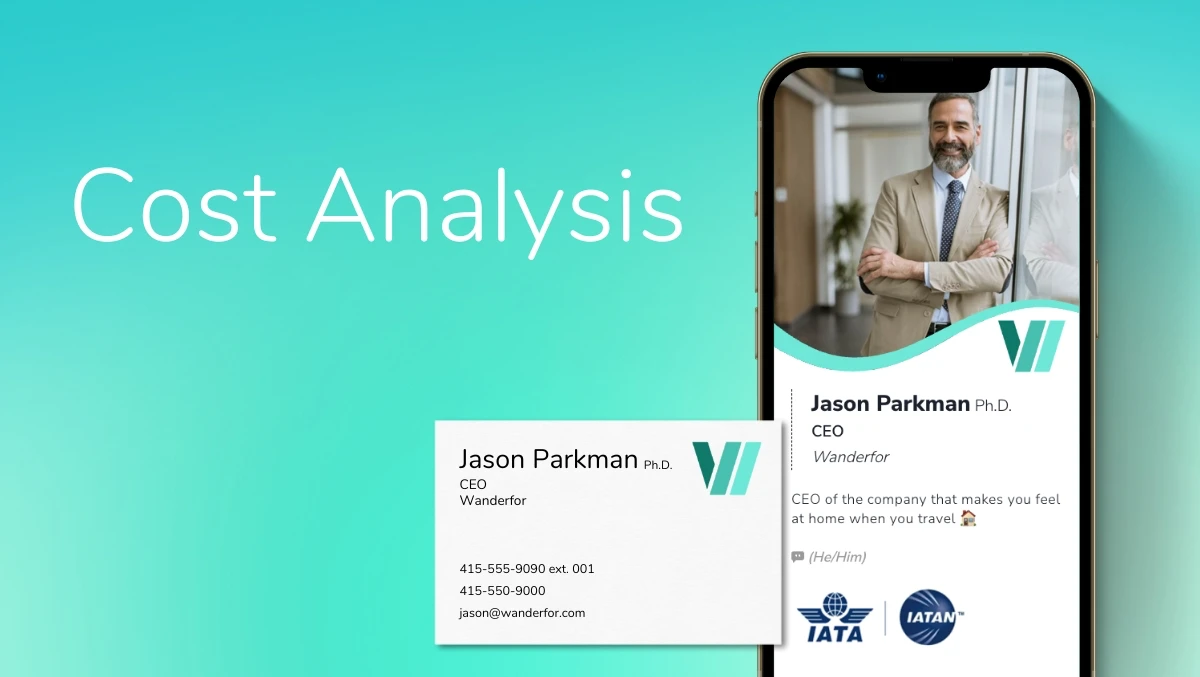
Business cards are an essential part of any organization but require an upfront investment. To better understand this expense, HiHello—the leading digital business card platform for individuals and businesses—researched the direct cost of traditional paper business cards.
In this analysis, we will discuss our findings and break down the various costs associated with paper business cards. We will explain how we calculated these costs, share our results, and then compare them to the cost of a digital business card.
We researched the direct cost of purchasing paper business cards for a 100-person company, including materials, hiring a designer, ordering new cards, and shipping. We found that, on average, companies spend 26% more using paper business cards than digital ones.
We found that most people start by purchasing 250 or 500 cards when ordering business cards. For this analysis, we calculated the cost of ordering 250 business cards per person for a 100-person company. We analyzed the five leading printed business card suppliers—Zazzle, Moo, Vistaprint, GotPrint, and Staples—and calculated each of the following cost factors:
Each business card supplier offered different material options, including paper, plastic, wood, and metal. We only considered the cost of paper cards, as they are the most common business card material. When looking at paper cards, there were several style upgrade options:
We created two business cards—one basic and one upgraded—to find a price range. We did this for each supplier and calculated the average material cost.
Cost of materials (per employee): $37.95
Companies can spend thousands of dollars on a business card designer, especially during a launch or rebrand. While business card designers aren’t always necessary, many organizations do make the investment. We found that companies can spend anywhere from nothing up to $2500 on a business card designer. Because of this wide range, we took the average cost ($1,250) and then re-averaged it across a 100-person organization.
Cost of a business card designer (per employee): $6.25
Business cards must always have up-to-date information. We found that people's contact information changes roughly every three years between promotions, phone number updates, and switching jobs.
With this in mind, in a 100-person company, 33 employees will need new or updated cards throughout the course of one year.
Cost of updating or ordering new cards (distributed amongst all employees): $12.52
Companies often overlook the shipping cost associated with traditional business cards. The cost of shipping varies greatly depending on speed and location. We took into account each factor:
If a company opts to ship all business cards to its headquarters, shipping costs can be as low as $1.70 per employee. However, if a company chooses to deliver business cards to each employee’s satellite or home office, that cost becomes $7.51 per employee.
Because of the now largely distributed workforce, shipping cards to multiple locations is the more likely scenario.
Cost of shipping (per employee): $7.51
Several costs are associated with ordering, printing, and shipping traditional business cards. After researching the five leading paper business card suppliers, we found that, on average, companies spend $64.23 per employee on business cards each year. This means that a 100-person company will spend nearly $6,500, and a 500-person company will spend over $32,000 alone on business cards.
With digital business cards, you can avoid high material, designer, and shipping costs and instead lock in a flat fee for the number of people within your organization. Digital business card platforms allow you to add and remove employees, update cards, and quickly create and distribute instant-use cards without any hidden costs or additional fees.
For example, HiHello offers two digital business card subscription plans for organizations: HiHello Business and HiHello Enterprise. HiHello has tiered pricing—the monthly cost per user reduces as the number of users grows. With HiHello, a 100-person company will spend $48.00 per employee yearly, or $4,800 for the entire company.
In addition to cutting the cards' costs, the subscription fee includes additional features to help companies get even more from their business cards. These include:
Paper business cards are—at a minimum—26% more expensive than digital business cards. That percentage increases if you upgrade your card to a premium paper weight, style, material, or color.
Digital business cards are the more cost-effective solution for companies. They have a lower direct cost and have several features that can increase your card’s return on investment (ROI). Because of HiHello’s tiered pricing, larger organizations will save even more of their business card budget. Learn more about the return on investment of your business cards in our ROI deep dive.
Going digital isn't only good for your budget. Digital business cards are also a better choice for the environment. To learn the true environmental impact business cards have on the environment, read our sustainability report.
HiHello is changing how you manage your business. It starts with a digital business card built from the ground up to be delightful, customizable, and secure. HiHello’s digital business cards unlock new opportunities, cut the costs of traditional cards, and have a positive environmental impact. Hundreds of thousands of professionals worldwide trust HiHello to grow their network.